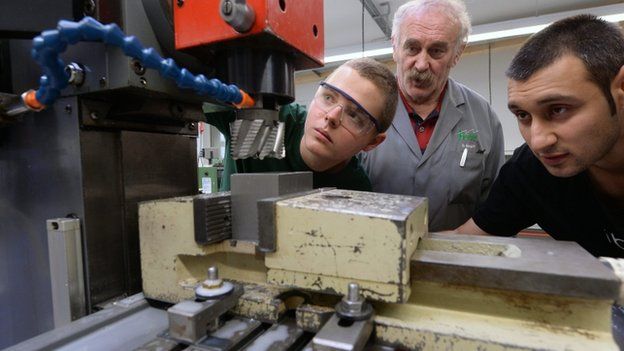Young people who do not go to
university are "overlooked and left behind", says a report by the House
of Lords social mobility committee.
It says this affects the majority of UK youngsters who do not take A-levels (Highers in Scotland) or degrees.The report says youngsters are let down by an over-emphasis on higher education and lack of training options.
The Department for Education said it was investing in apprenticeships in England.
The report's findings were supported by Malcolm Trobe, leader of the ASCL head teachers' union. "The intense academic focus of the existing curriculum is too narrow for some students and a new approach is needed."
The Lords report argues that while there is so much focus on the numbers entering university, the majority of young people in the UK do not opt for academic study after the age of 16.
"In England, in 2013-14, of a total population of 1,285,800 16 and 17-year-olds, only 47% (601,500 people) started A-levels, whereas 53% (684,300) did not do so," the report says.
The Lords research finds that for those who do not follow an academic route, the system is "complex and incoherent".
"Careers advice and education are being delivered in a way which means that too many young people simply drift into further studies or their first job, which often has no real prospect of progression."
Academic focus
The report says league tables encourage schools to focus on academic results and this "can dishearten young people" who are middle-ability achievers and can limit social mobility.While recognising the value of apprenticeships, the committee says they are only taken by 6% of 16 to 18 year olds. Among those beginning apprenticeships in 2014-15, 77% were over 19 and 42% over 25.
The Lords report also notes that government policy has protected schools and university funding, but not the budgets of post-16 colleges which serve the majority of youngsters who do not go on to university.
It finds an inequality in investment, with a university student receiving about £6,000 more per year of public funding than a young person attending college.
It criticises a "confused" qualifications system that has been subjected to continual change and does not guarantee quality employment.
"The qualifications themselves are often poorly understood by employers. Employers cannot be expected to understand what skills unfamiliar qualifications represent and cannot be expected to have knowledge and faith in their quality."
The report says: "There is a culture of inequality between vocational and academic routes to work. The culture pervades the system and the incentives to everyone involved."
The report cites Switzerland and Germany as countries which operate successful and respected systems of both vocational and academic pathways into employment.
The Lords' recommendations include:
- stopping the national curriculum at the age of 14, not 16
- "move away from age 16 being the cut-off point at which many young people embark on the wrong path"
- independent careers advice
- the government should help collaboration between schools and colleges and employers
- a Cabinet-level minister to take responsibility for the transition from school to work
Young people's comments to the committee
"The message was 'do your A-levels, then progress on to university', as though that was the only route!""I left three months before the end of my A-levels due to stress, pressure and anxiety... I was not prepared for any other options - I did not know about apprenticeships."
"I had always been told that I had to do A-levels and then go to university. I decided that that wasn't what I wanted to do, but had no idea what to do when I left school."
Committee chairman Baroness Corston said the current system for helping people move from school to work was failing most young people, limiting their opportunity for social mobility.
"To focus on university or apprenticeships, to the exclusion of other routes, is to the detriment of many talented and able young people," she said.
"A young person considering their options for further education or employment is presented with gobbledygook - it is totally unclear to them how they can get the skills needed for a successful career."
The report was welcomed by Alice Barnard, chief executive of the Edge Foundation, which campaigns to raise the status of vocational education.
"The Social Mobility Committee is absolutely right. The inequality between academic and vocational education is unfair, restricts social mobility and does not meet the UK's economic needs."
A Department for Education spokeswoman said: "We have introduced a more rigorous curriculum so every child learns the basic skills they need such as English and maths so they can go on to fulfil their potential whether they are going into the world of work or continuing their studies.
"We will invest £70m in our careers strategy over the course of this parliament to transform the quality of careers education."
The Scottish Government says it is taking forward a range of actions aimed at reducing youth employment by 40% by 2021.
This includes bringing schools, college and employers closer together to open up work opportunities to everyone, whatever their background or gender.


No comments:
Post a Comment